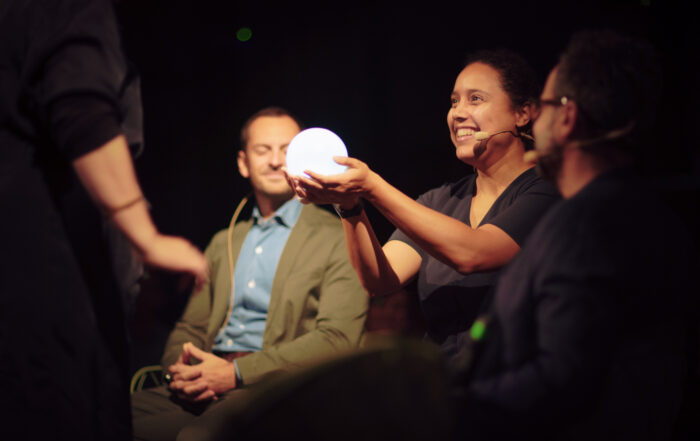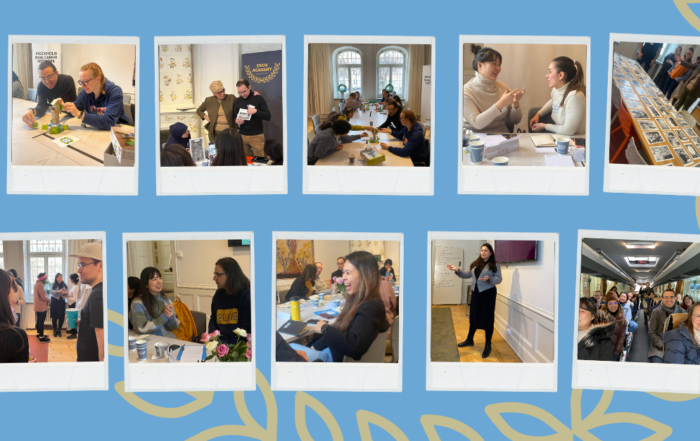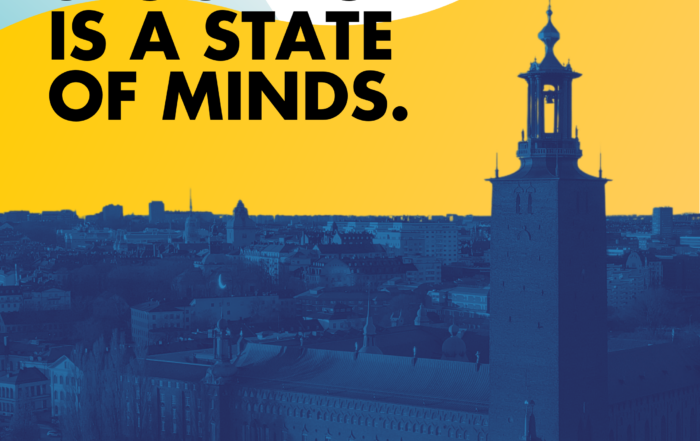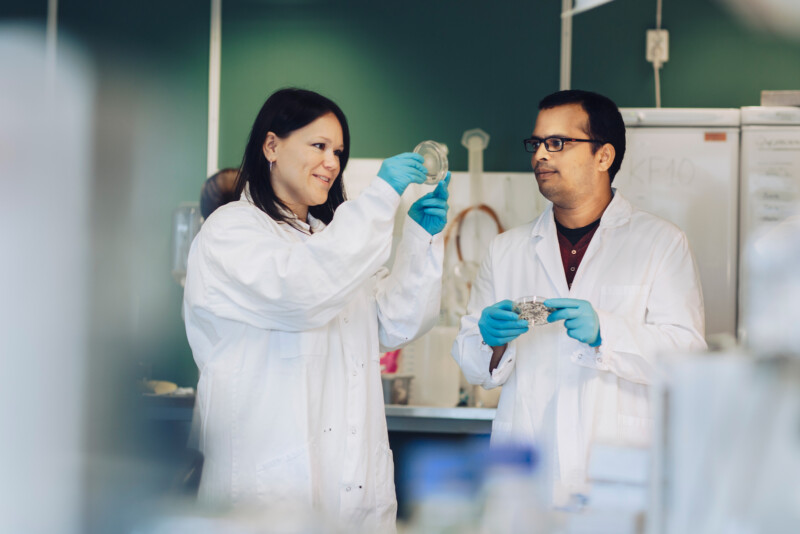
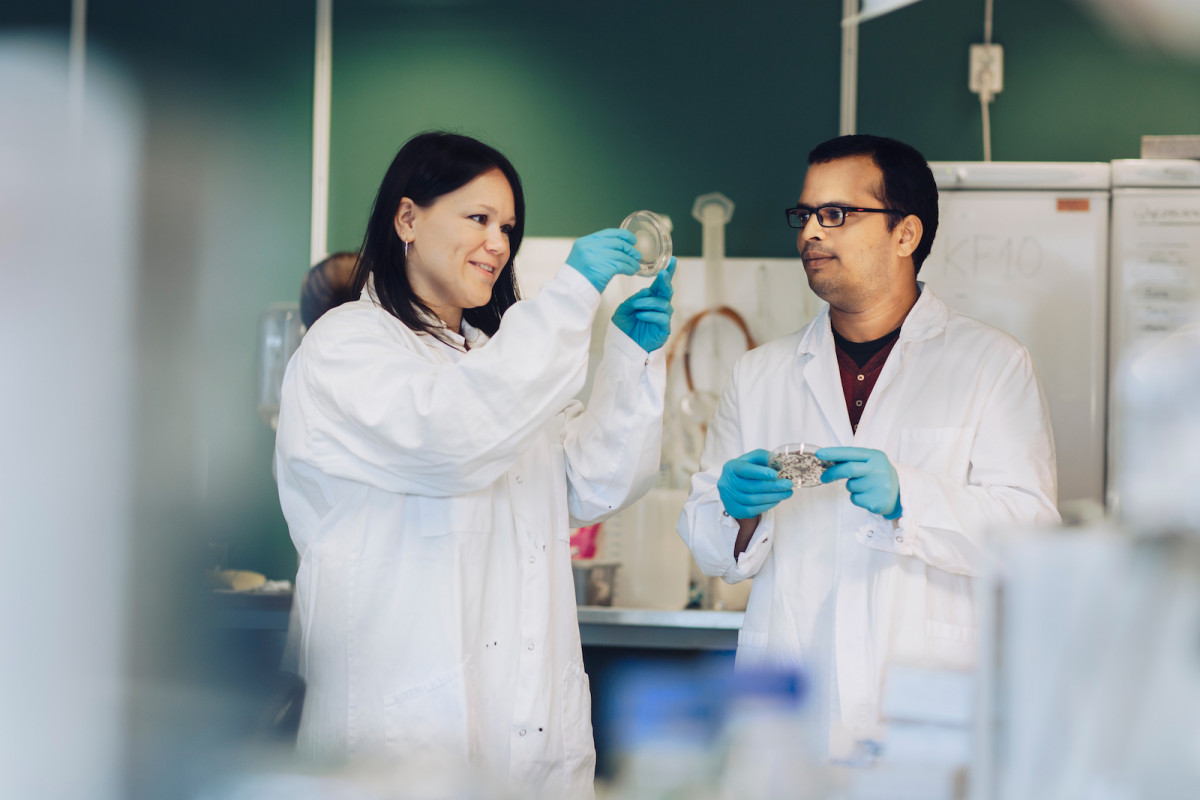
1 April, 2020
The Academy’s united forces in the Corona crisis
The Academy’s responsibility and creativity to face the Corona pandemic is huge. To close down the physical premises of the universities and switch to digital education took just a few hours, at the 18 universities and university colleges with approximately 90,000 students and 20,000 employees annually. This requires great flexibility and ingenuity to find new routines and offer full-fledged education for students. But creativity and the willingness to contribute with expert knowledge and practical efforts are great in so many ways.
At Stockholm University, people at the Chemistry Department mix hand sanitizer for current health care needs. The last weeks they have produced thousands of liters for the three major hospitals in Stockholm, to the elderly care in City of Stockholm and to the ambulance care. Other material is also collected at the university, such as gloves and mouth protections, which is currently making greater use in health care.
At Sophiahemmet University, an intensive training program has been developed for people who have first aid training or basic medical training. The training that starts this week, will, after just three days, be able to make hundreds of people ready to support in the health care. For example, laid-off aircraft personnel who are trained in service can help serve food and breakfast, help patients and relatives, and more.
At KTH Royal Institute of Technology, a research group is working on developing an analytical method that will be able, on a large scale, to test whether a person is immune to Covid-19. The research team believes that they will be able to get started with sampling in a few weeks.
On behalf of the National Board of Health and Welfare, the Karolinska Institutet quickly produced some e-learning courses aimed at healthcare professionals who meet people with suspected or confirmed Covid-19. At Karolinska Institutet there are also many employees medically trained who supports the hospitals and / or contribute their expertise in different contexts.
The medical students at Karolinska Institutet have also gathered to be able to work in the health care and help wherever they can. In the same way students at KTH Royal Institute of Technology, have organized themselves to provide free math help to high school students who have distance learning, studying from home.
At Konstfack – University of Arts, Crafts and Design, another initiative has been taken. People at the university produce 3D printed visor bows and send them to Karolinska University Hospital and to S:t Görans Hospital. KTH and Stockholm University also keep their 3D printers up and running for the same case.
Several of the higher education institutions have also compiled expert lists covering knowledge in a number of areas in the natural sciences, medicine, social sciences, the humanities and science of engineering. The Vice-Chancellor of the Erica Foundation, Anna Norlén, with her expertise on how children handle a crisis is just one example of all those who figure in the media to help understand and facilitate the current crisis.
Knowledge is crucial to the development and welfare of a society. In times of crisis, it becomes even clearer what the academy’s cross-border ideas and approach contribute. Not only with knowledge and new research, but also with the ability to innovation, fast adaptation and creativity.
1 April, 2020
The Academy’s united forces in the Corona crisis
The Academy’s responsibility and creativity to face the Corona pandemic is huge. To close down the physical premises of the universities and switch to digital education took just a few hours, at the 18 universities and university colleges with approximately 90,000 students and 20,000 employees annually. This requires great flexibility and ingenuity to find new routines and offer full-fledged education for students. But creativity and the willingness to contribute with expert knowledge and practical efforts are great in so many ways.
At Stockholm University, people at the Chemistry Department mix hand sanitizer for current health care needs. The last weeks they have produced thousands of liters for the three major hospitals in Stockholm, to the elderly care in City of Stockholm and to the ambulance care. Other material is also collected at the university, such as gloves and mouth protections, which is currently making greater use in health care.
At Sophiahemmet University, an intensive training program has been developed for people who have first aid training or basic medical training. The training that starts this week, will, after just three days, be able to make hundreds of people ready to support in the health care. For example, laid-off aircraft personnel who are trained in service can help serve food and breakfast, help patients and relatives, and more.
At KTH Royal Institute of Technology, a research group is working on developing an analytical method that will be able, on a large scale, to test whether a person is immune to Covid-19. The research team believes that they will be able to get started with sampling in a few weeks.
On behalf of the National Board of Health and Welfare, the Karolinska Institutet quickly produced some e-learning courses aimed at healthcare professionals who meet people with suspected or confirmed Covid-19. At Karolinska Institutet there are also many employees medically trained who supports the hospitals and / or contribute their expertise in different contexts.
The medical students at Karolinska Institutet have also gathered to be able to work in the health care and help wherever they can. In the same way students at KTH Royal Institute of Technology, have organized themselves to provide free math help to high school students who have distance learning, studying from home.
At Konstfack – University of Arts, Crafts and Design, another initiative has been taken. People at the university produce 3D printed visor bows and send them to Karolinska University Hospital and to S:t Görans Hospital. KTH and Stockholm University also keep their 3D printers up and running for the same case.
Several of the higher education institutions have also compiled expert lists covering knowledge in a number of areas in the natural sciences, medicine, social sciences, the humanities and science of engineering. The Vice-Chancellor of the Erica Foundation, Anna Norlén, with her expertise on how children handle a crisis is just one example of all those who figure in the media to help understand and facilitate the current crisis.
Knowledge is crucial to the development and welfare of a society. In times of crisis, it becomes even clearer what the academy’s cross-border ideas and approach contribute. Not only with knowledge and new research, but also with the ability to innovation, fast adaptation and creativity.

